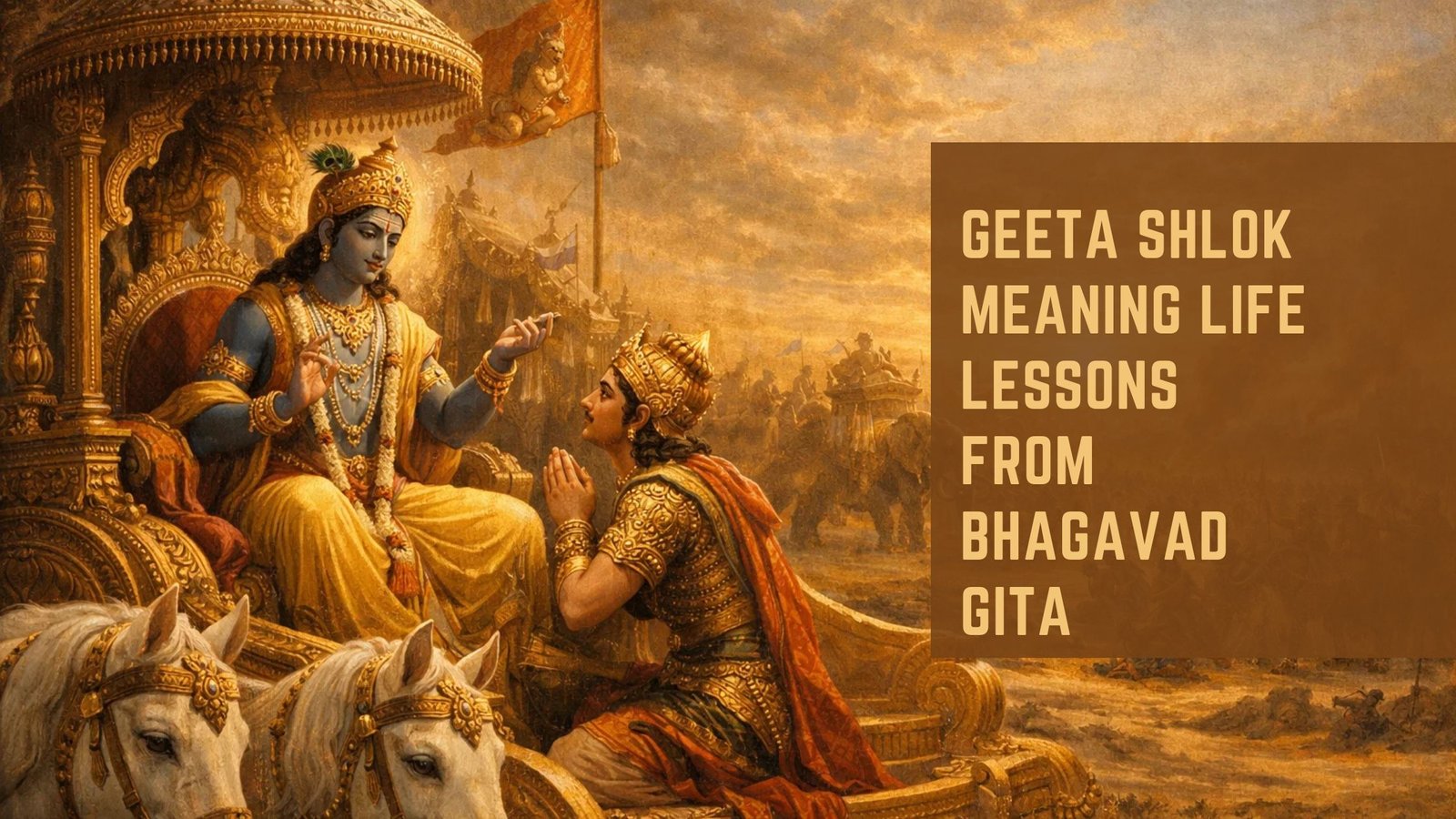The Bhagavad Gita, a revered text within the Indian philosophical and spiritual tradition, serves as a profound guide for understanding the nature of existence and the relationship between the divine and humanity. Among its many verses, Chapter 10, Verse 10 stands out as a significant declaration of divine grace and wisdom. In this verse, Lord Krishna reveals his intimate connection with those who seek him earnestly, promising to bestow knowledge and understanding upon them.
This promise encapsulates the essence of divine love and guidance, inviting individuals to explore the depths of their spiritual potential. In the context of the Gita, this verse is not merely a statement but a call to action for seekers of truth. It emphasizes the importance of devotion and surrender to the divine will, suggesting that true knowledge arises from a heartfelt connection with the divine.
As one delves into the teachings of this verse, it becomes evident that it offers a pathway to enlightenment, encouraging individuals to cultivate a relationship with the divine that transcends mere intellectual understanding. The exploration of Bhagavad Gita 10:10 thus opens a door to deeper spiritual insights and personal transformation.
Key Takeaways
- Bhagavad Gita 10:10 introduces the divine glory and its significance in the world.
- Understanding the divine qualities and their manifestation in the world is essential for spiritual growth.
- Bhagavad Gita 10:10 highlights the relationship between the divine and humanity, emphasizing the interconnectedness of all beings.
- Applying the teachings of Bhagavad Gita 10:10 in daily life can lead to a more fulfilling and purposeful existence.
- Embracing the divine glory can bring about a deeper understanding of the world and our place in it.
Understanding the Divine Glory
The concept of divine glory is multifaceted, encompassing attributes such as omniscience, omnipotence, and boundless compassion. In Bhagavad Gita 10:10, Lord Krishna articulates his divine nature by emphasizing that he imparts wisdom to those who are devoted to him. This wisdom is not limited to intellectual knowledge; rather, it encompasses a profound understanding of life’s mysteries and the interconnectedness of all beings.
The divine glory, as described in this verse, reflects an all-encompassing presence that nurtures and guides humanity toward its highest potential. Moreover, understanding divine glory involves recognizing the transformative power it holds in the lives of individuals. When one opens their heart to receive divine wisdom, they embark on a journey of self-discovery and spiritual awakening.
This process often leads to a greater sense of purpose and fulfillment, as individuals begin to align their actions with higher principles. The divine glory is not an abstract concept; it manifests in tangible ways through acts of kindness, compassion, and love, inspiring individuals to embody these qualities in their own lives.
The Significance of Bhagavad Gita 10:10

The significance of Bhagavad Gita 10:10 extends beyond its immediate context within the scripture; it resonates deeply with seekers across time and cultures. This verse serves as a reminder that the divine is accessible to all who earnestly seek it. In a world often filled with confusion and uncertainty, the promise of divine guidance offers solace and hope.
It reassures individuals that they are not alone in their struggles; rather, they are supported by a higher power that desires their growth and enlightenment. Furthermore, this verse highlights the reciprocal nature of the relationship between humanity and the divine. While individuals are encouraged to seek knowledge and wisdom from the divine, they are also called to cultivate devotion and surrender.
This dynamic interplay fosters a sense of trust and faith, allowing individuals to navigate life’s challenges with grace. The significance of Bhagavad Gita 10:10 lies in its ability to inspire individuals to embark on a spiritual journey characterized by devotion, humility, and an unwavering commitment to truth.
Exploring the Divine Qualities
| Divine Quality | Description |
|---|---|
| Love | Unconditional affection and compassion towards all beings |
| Peace | Tranquility and harmony in mind, body, and spirit |
| Compassion | Deep awareness of the suffering of others and a desire to alleviate it |
| Forgiveness | Letting go of resentment and granting pardon to others |
| Gratitude | Feeling thankful and appreciative for the blessings in life |
In Bhagavad Gita 10:10, Lord Krishna reveals several divine qualities that are essential for understanding the nature of divinity. Among these qualities are wisdom, compassion, and love—attributes that serve as guiding principles for human conduct. Wisdom, in this context, is not merely intellectual knowledge but an intuitive understanding of life’s deeper truths.
It empowers individuals to make choices aligned with their highest selves and fosters a sense of clarity amidst chaos. Compassion is another vital quality that emerges from this verse. The divine presence embodies an unwavering love for all beings, encouraging individuals to extend kindness and empathy toward others.
This quality is particularly significant in today’s world, where divisions and conflicts often overshadow our shared humanity. By embracing compassion as a core value, individuals can contribute to healing and unity within their communities. Love, as expressed in Bhagavad Gita 10:10, transcends personal attachments and extends to all living beings.
It invites individuals to cultivate an attitude of unconditional love, recognizing that every being is interconnected within the tapestry of existence. By embodying these divine qualities—wisdom, compassion, and love—individuals can transform their lives and positively impact those around them.
The Manifestation of the Divine in the World
The manifestation of the divine in the world is a theme that resonates throughout the Bhagavad Gita. In Chapter 10, Lord Krishna elucidates how he embodies various forms within creation, illustrating that divinity is not confined to a distant realm but is present in every aspect of life. This perspective invites individuals to recognize the sacredness inherent in all beings and experiences.
By acknowledging the divine presence in everyday life, individuals can cultivate a deeper appreciation for the world around them. Moreover, this manifestation serves as a reminder that divinity can be experienced through nature, relationships, and acts of service. Each moment presents an opportunity to connect with the divine essence that permeates existence.
Whether through witnessing the beauty of a sunset or engaging in selfless acts for others, individuals can find glimpses of the divine in their daily lives. This awareness fosters gratitude and reverence for life itself, encouraging individuals to live with intention and purpose.
The Relationship between the Divine and Humanity

The relationship between the divine and humanity is central to the teachings of Bhagavad Gita 10:10. It emphasizes that while humanity seeks knowledge and guidance from the divine, there exists an inherent connection that binds them together. This relationship is characterized by love, trust, and mutual respect.
The divine does not impose its will upon humanity; rather, it invites individuals to engage in a dialogue marked by sincerity and devotion. This dynamic relationship encourages individuals to cultivate a sense of humility as they approach the divine. Recognizing one’s limitations fosters an openness to receive guidance and wisdom from a higher source.
In turn, this humility allows for personal growth and transformation as individuals align their actions with higher principles. The relationship between the divine and humanity is thus one of co-creation—a partnership that empowers individuals to manifest their highest potential while remaining grounded in their spiritual essence.
Applying the Teachings of Bhagavad Gita 10:10 in Daily Life
Applying the teachings of Bhagavad Gita 10:10 in daily life requires intentionality and mindfulness. Individuals are encouraged to cultivate a practice of devotion—whether through prayer, meditation, or acts of service—that fosters a deeper connection with the divine. By dedicating time each day to reflect on one’s intentions and actions, individuals can align themselves with higher values and principles.
Additionally, embracing humility is essential for applying these teachings effectively. Recognizing that one does not possess all answers allows for openness to learning from others and from life experiences. This humility cultivates an attitude of gratitude for the wisdom received from both the divine and fellow beings.
As individuals embody these teachings in their daily interactions—through kindness, compassion, and understanding—they contribute to creating a more harmonious world. Furthermore, integrating these teachings into daily life involves recognizing opportunities for service and selflessness. Engaging in acts that uplift others not only reflects one’s devotion but also reinforces the interconnectedness emphasized in Bhagavad Gita 10:10.
By embodying these principles consistently, individuals can transform their lives into expressions of divine love and wisdom.
Embracing the Divine Glory
In conclusion, embracing the divine glory articulated in Bhagavad Gita 10:10 invites individuals into a profound journey of self-discovery and spiritual awakening. This verse serves as a reminder that divine wisdom is accessible to all who earnestly seek it with an open heart. By understanding the significance of this teaching, exploring divine qualities such as wisdom and compassion, and recognizing the manifestation of divinity in everyday life, individuals can cultivate a deeper connection with their spiritual essence.
The relationship between humanity and the divine is one marked by love, trust, and mutual respect—a partnership that empowers individuals to navigate life’s challenges with grace. By applying these teachings in daily life through devotion, humility, and acts of service, individuals can transform their existence into a reflection of divine glory. Ultimately, embracing this journey allows for personal growth while contributing positively to the world around them—a testament to the enduring power of love and wisdom found within Bhagavad Gita 10:10.
In Exploring the Wisdom of the Gita: Essays on Spiritual Enlightenment, the profound teachings of the Bhagavad Gita are delved into, shedding light on the spiritual enlightenment that can be attained through its verses. Chapter 10 verse 10 of the Bhagavad Gita emphasizes the omnipresence of the divine in all beings, a concept that is further explored in this insightful article. The Gita serves as a spiritual guide, as highlighted in The Bhagavad Gita: Gandhi’s Spiritual Guide, inspiring individuals to find purpose and inner peace, as discussed in The Message of the Bhagavad Gita: Finding Purpose and Inner Peace.
FAQs
What is the significance of Bhagavad Gita chapter 10 verse 10?
Bhagavad Gita chapter 10 verse 10 is a verse from the ancient Indian scripture, the Bhagavad Gita. In this verse, Lord Krishna describes how he manifests in various forms and how he is the source of all beings and things.
What does Bhagavad Gita chapter 10 verse 10 teach?
Bhagavad Gita chapter 10 verse 10 teaches the concept of divine omnipresence and the idea that the divine can manifest in various forms. It emphasizes the idea that the divine is the source of all beings and things.
How is Bhagavad Gita chapter 10 verse 10 relevant today?
Bhagavad Gita chapter 10 verse 10 is relevant today as it teaches the timeless concept of the omnipresence of the divine and the interconnectedness of all beings. It can provide spiritual guidance and insight for individuals seeking a deeper understanding of the divine.
What are the key teachings of Bhagavad Gita chapter 10 verse 10?
The key teachings of Bhagavad Gita chapter 10 verse 10 include the idea that the divine can manifest in various forms and that the divine is the source of all beings and things. It also emphasizes the interconnectedness of all beings and the omnipresence of the divine.














